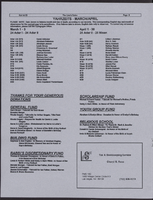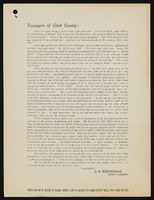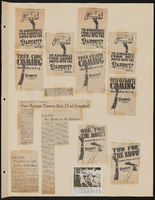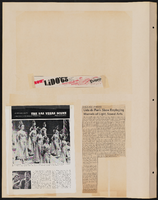Search the Special Collections and Archives Portal
Search Results
Mesquite Club Records
Identifier
Abstract
The Mesquite Club Records (1911-2016) contain the organizational files of the Mesquite Club, the oldest women's service club in Las Vegas, Nevada. Materials include meeting agendas and minutes, correspondence, committee reports, newsletters, scrapbooks, and photographic prints and negatives. The records document the club's administrative structure, community service projects, social events, and relationship with the General Federation of Women's Clubs (GFWC).
Archival Collection
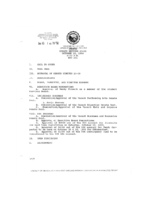
Meeting minutes for Consolidated Student Senate University of Nevada, Las Vegas, October 18, 1990
Date
Archival Collection
Description
Text
Chester R. Longwell Professional Papers
Identifier
Abstract
The Chester R. Longwell Professional Papers (1886-1974) document Longwell's professional career as a geologist and his pioneering field work in Clark County, Nevada. Included are Longwell's field notes; manuscripts, articles and speeches related to geology; personal and business correspondence; professional publications; subject and name files; specimen tags; photographic prints, negatives, and slides; and geological and topographical maps, primarily of Nevada, California, Arizona, and Utah.
Archival Collection

Transcript of interview with Mary Ellen Campbell by Ronald Robinson, March 6, 1977
Date
Description
On March 6, 1977, Ronald Robinson interviewed Mary Ellen Campbell (born 1886 in Panaca, Nevada) about her life in Nevada. Campbell first talks about her parents’ move to the United States from England and her own life growing up in Panaca. She also talks about living in Pioche and the conditions of living in these two small Nevada towns. Also present during the interview is Mary’s grandson, Allen Campbell, who sometimes asks a few questions as well.
Text

Transcript of interview with Carl Ciliax by Gary Wood, March 8, 1980
Date
Archival Collection
Description
On March 8, 1980, Gary Wood interviewed Carl Ciliax (born 1941 in Las Vegas, Nevada) about his experiences living in Nevada. Ciliax first describes his family history, his early interests in wildlife, and his background and education in artwork. Ciliax then discusses his early experiences in hunting and his eventual interest in conservationism and preservation, including his involvement with organizations that sought the protection of desert bighorn sheep and the protection of wildlife in general. The two talk more about wildlife, the early development of Las Vegas, and the effects of the atomic testing. The interview concludes with Ciliax’s recollection of recreational activities and some of his thoughts on conservationism.
Text

